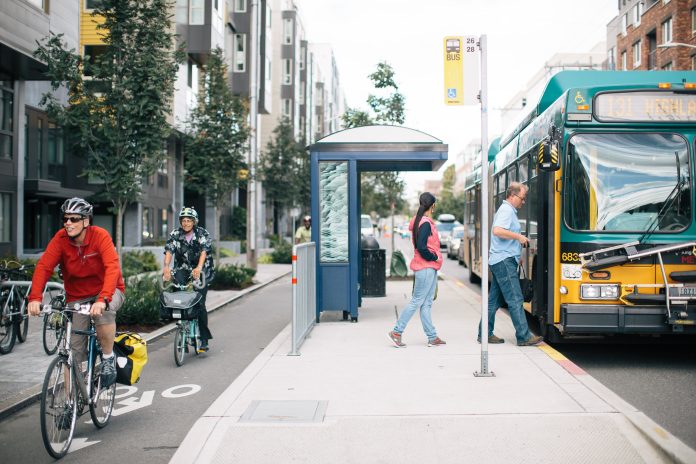Feet First believes in walkable places to improve our quality of life–communities with safe walking conditions, nearby jobs, stores, services, parks and gathering places, all connected to each other by frequent and reliable transit. We know we have far to go to reach that vision, and the passage of Initiative 976 dramatically increases the challenge. Counties, cities, and towns across the state have lost a critical funding source to maintain and improve the local streets which support all ways of traveling. Local transit agencies will have to cut services, which hurts most those who must walk or roll.
There is an immediate need to replace the lost funding, but we also must examine the policies that have led to systematically underfunding local streets and transit–making so many of our communities virtually unwalkable. The I-976 crisis is an opportunity for Governor Jay Inslee and the state legislature to address fundamental policy issues.
Put simply, Washington State policymakers have not let go of a 1950s planning paradigm that prioritizes moving the largest number of vehicles possible at high speeds. The result is an over-reliance on new highway construction while neglecting basic maintenance, as well as denying local jurisdictions the financing they need for safe local streets and robust transit.
From a transportation perspective, we’ve learned that focusing on moving a high volume of cars simply cannot meet our state’s transportation needs. Roger Millar, secretary of the Washington State Department of Transportation (WSDOT), was recently quoted as saying that WSDOT “spent 75% of its capital budget on expanding roads from 2004 to 2011 and increased lane capacity only by 1%.”
This policy emphasis has also deprioritized the safety, health and environmental futures of Washington state residents. Pedestrian deaths have doubled over the last decade, communities near state highways are burdened with greater rates of lung diseases, Puget Sound is more polluted, and the state’s greenhouse gas emissions are increasing.
The crisis caused by I-976 will not be solved by holding onto the policies and priorities that brought us to this point. It’s time to flip the focus. We are calling on the Governor and Legislature to review existing spending and reprioritize spending. Feet First recommends that Governor Inslee and the Legislature take the following specific actions as expeditiously as possible:
- Place a moratorium on road and highway expansion, and focus on maintenance first, particularly on projects that enhance safety on state routes through local communities where a significant number of pedestrian deaths occur.
- Give counties, cities, and towns more direct funding for local maintenance and street improvements, including funding for complete streets.
- Give local jurisdictions the progressive fundraising tools and authority they need to replace car tabs, so that they can adequately fund local transit, local streets, and walkable communities.
We recognize that these are significant changes to current transportation policy. But current spending patterns are based on metrics–numbers of cars and their speed–that are ineffective at ensuring mobility, are fiscally unsustainable, and literally dangerous. Feet First–drawing inspiration from Transportation For America’s recently adopted transportation principles for the next federal infrastructure bill–believes in the following principles:
- Real Mobility Matters. The point of a transportation system is to connect people to the places they need to go–no matter whether they travel by transit, foot, bike, wheelchair or vehicle. We need to measure mobility (e.g., how many jobs are within reach by walking and transit or how many stores are in reach by walking or rolling)–rather than just measuring cars. Our focus on cars has led us to spend billions to build roads and yet traffic is worse than ever. More transit access, dedicated bus lanes, ADA compliant sidewalks, safe routes to school, as well as more mixed use neighborhoods, all increase mobility without increasing driving and the number of cars.
- Prioritize Safety Over Speed. Major projects are now funded to reduce vehicle delay. State highways through small towns are built too wide and too fast. Localities are starved of the funding needed to finance sidewalks, crosswalks, and curb ramps. If we prioritize safety, we would first give local jurisdictions the financing they need for maintaining and improving local streets for those walking, biking, or rolling–improving health, access to transit, and local economic vitality.
- Maintenance First. We understand the politics that make megaprojects happen, but the consequences of neglecting basic maintenance is becoming ever more apparent to voters. Every level of government has difficulty taking care of the basics. At the state level this means a moratorium on road expansion, using the savings to fund both highway and local street maintenance. It also means giving local jurisdictions the financing tools they need to take care of local streets.
- Equity. Our spending should strive to ensure every Washington resident, no matter where they live or their personal circumstances, have access to their community. Tax sources for transportation should not be regressive (such as flat rate car tabs) but they must be adequate to meet the public’s most basic need to move safely in our communities on foot. Every town and city should have the means to support local residents and businesses with complete local streets and transit.
If we have the courage and wisdom to reform transportation policy, we can improve mobility, our economy, our quality of life, our health and our environment. We know people love walkable places–now is the time to renew our commitment to them.
Feet First began in 1995 as a group of citizens and professionals interested in promoting walkable communities. In 2001, we became an official 501(c)(3) nonprofit. Today, we’re a fast-growing organization with passionate board members, staff, and volunteers supporting our vision of creating more places to walk in order for people to connect by walking for their health, transportation, environment, community, and pleasure. Visit the Feet First website for more information.
Feet First began in 1995 as a group of citizens and professionals interested in promoting walkable communities. In 2001, we became an official 501(c)(3) nonprofit. Today, we’re a fast-growing organization with passionate board members, staff, and volunteers supporting our vision of creating more places to walk in order for people to connect by walking for their health, transportation, environment, community, and pleasure.



